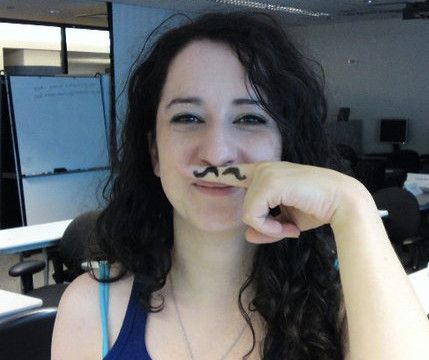Impostor syndrome is an internal experience of feeling or believing that you are not as competent as others perceive you to be.
According to Wikipedia, “Among Us is a multiplayer game for four to ten players. Up to three players are randomly chosen to be the impostor(s) each round.”
In Among Us, you either play as a crew member, trying to perform tasks on your airship, minding your business or as an impostor, hell-bent on sabotaging the airship by acts of vandalism or straight-up murder. The crew members try to figure out who the impostor is by having emergency meetings and discussing who can vouch for the whereabouts of other people or by watching for behavioural cues (a.k.a. who is acting shady). The impostors pretend to do the same tasks as the crew members and look the same as them, so the only clear difference is their end goal.
The crew members are obviously incentivised to oust the impostor, the impostors are obviously incentivised to stay hidden.
There are impostors among us! Let’s call an emergency meeting before the bodies pile up!
So what is impostor syndrome and how does it relate to a popular multiplayer game?
Impostor syndrome is an internal experience of feeling or believing that you are not as competent as others perceive you to be.
It is the feeling that you have unwittingly been chosen as the impostor on this airship by life (or the big cosmic RNG) and instead of wilful acts of sabotage, you are bringing this ship down by sheer incompetence.
This is probably the right time to call out that: no, you are not an impostor. Really. I repeat you are not an impostor! If you’re not an impostor, then am I one? No!... Well… maybe? To be completely fair, I do have bouts of both insecurity and feelings of impostorness(?) impostorship(?), without any of the fun sabotage or murder that Among Us would lead you to believe this entails. For most of us, it starts with a moment of panic (I have been discovered), followed by a longer-lasting feeling of anxiety (things are going to start to fall apart).
If you are not an impostor, and I’m (maybe) not an impostor, then where does this feeling come from? Why do we feel like at any moment someone will unmask us and it will be a whole thing? Why do I live with this anxiety, if I don’t have to? If all it took was for some stranger on the internet to sit you down and tell you that you are, in fact, not the Impostor and you will not bring this whole airship down, then have we all been bamboozled into playing life on “Hard mode”?
Mask Off / Airlocked
So if the solution is not a stranger on the internet giving you the answers™ or accepting your ultimate unmasking, then what is? Well, while I am a stranger on the internet, I do not have the ultimate answers. What can I add to a conversation that much smarter and more well-informed people have been having for a long time? Honestly, probably not much, but I do have some personal experience as both a person often feeling like an impostor and a person trying to help my colleagues, my direct reports, and friends deal with feelings of… being a fraud.
From here on out, I will be speaking about my personal experiences and what I’ve found has worked for me or my friends/colleagues.
Let’s try and dissect the problem via the definition of the problem. It’s an “internal experience of feeling that you are not as competent as others perceive you to be”.
Internal experience or feeling …
Internal experience: it is something that you feel inside, the way you view the world from the command centre of your brain.
Shocking I know… Another way of reading that is: it is a thought or feeling that you do not externalise. You keep it inside, usually for feelings of shame or fear that it will speed up your inevitable unmasking as the impostor you really are. These internal experiences, whether triggered by an event or slowly built up from a multitude of experiences/comments will usually snowball into a much larger and scarier composite fear, overwhelming and infecting other, more positive experiences.
So to combat the avalanche-iness of this built-up fear, what has worked for me has been to externalise these thoughts or feelings. Externalising can take place in multiple ways: you can try to just voice it to yourself or your friends, you can talk to a therapist who can help you untangle and explore where this feeling is coming from, or most radically, you can talk to the person who you feel is triggering this feeling in you. Have a frank conversation with them about feelings, experiences. That is, admittedly, the scariest, maybe riskiest option, requiring you to put yourself in a vulnerable position, but it can have radically positive effects (given that the other party is receptive). Once done, this can often feel like deflating a balloon or popping a large pimple of negativity.
I’ve utilised this approach most recently in dealing with a very specific piece of feedback that caused me to feel like I was wrong and had to change to be accepted and respected in my role/the company. I had a very difficult, vulnerable, and honest conversation with the person who made me feel this way. It was pretty difficult to navigate - both of us were immensely uncomfortable - but ultimately was very rewarding for both of us. This required both of us to trust that the other person has good intentions and assume that they are just unintentionally pushing our buttons. I generally believe that if I don’t give someone feedback on how what they do impacts me, then I shouldn’t expect them to be able to accommodate me.
So armed with that assumption, I gave them feedback on how their feedback impacted me and how they could have said the same thing without coming across like they were “othering” me. Then we had a conversation about impact vs. intent, and agreed to have these difficult conversations with each other more frequently.
One important thing I kept in mind was to use ‘I’ statements, or SBI feedback:
Situation: when/where said thing happened
Behaviour: what person did - specific actions
Impact: what impact their actions had on you.
Instead of saying “You were mean to me“, say “Last week during our one-to-one, you called me a scruffy-looking nerf-herder, which made me feel like was a tub of cookie dough in a tube-sock and also stupid”.
This generally helps avoid escalation of negative feelings, feelings of being “very attacked”, or getting into a playground insults fight.
...that you are not as competent...
Here we are talking about your perception of your ability to do something successfully or efficiently. How does one build a healthy, realistic perception of their own competence? How does one build a healthy self-image without looking entirely for external sources of validation?
One way is to build a log of achievements/value you’ve added. It can contain anything from work you’ve done, conversations you’ve led or taken a significant part of, blog posts you’ve written, socials you’ve organised, etc. This list can help strengthen your feelings of achievement and start to build a healthy view of your achievements as a whole. Look at it from the following angles:
What (what the thing was)
Why (what the impact was)
How (what your contributions were)
Who (who are the people who you worked with/for)

If you keep this log up-to-date, it can help strengthen or potentially fix your self-view. This can also help later on in having conversations with other people about your contributions, your performance, and your level/promotions.
If you’ve chosen to create a log, the next step, which is more optional and entirely work-related, can be to look at the levelling framework of your company or the levelling frameworks of other similar companies to see where you stand on a non-objective scale¹.
Take the levelling framework and your log and colour code the level you are/think you are in. Go through each line in your levelling framework and try to find an example in your log that matches well with the described trait/behaviour/deliverable:
- Colour the line in the framework green if you have a specific strong example of the behaviour/outcome in your log
- Colour it yellow, if you don’t have an example
- Colour it red, if you have a specific counter-example/improvement area of the behaviour/outcome
By the end, you will likely end up with a colouring book (or colour-coded levelling guide) that has some green, some yellow and some red, which can help drive a personal development plan around what you probably need to work on (red), what you already do well enough (green), what you need to demonstrate/do more of (yellow).
I utilised this technique when I worked with a manager in a different timezone who had no insight into what I was doing and gave me no feedback because of it. This lack of feedback started to grate on my confidence about my abilities. I created the log as a way to reassure myself that I was doing the right things and it helped me have a solid conversation about my performance, both with my manager and also the people I’d worked closely with on the projects.
¹Note that levelling frameworks are not at all objective, nor meaningful of what you are, just a reflection of how a said company views performance.
...as others perceive you to be
Your perception is your reality. How do you know what others realities are? Tying it back to the previous section, how does one build a healthy self-image without looking entirely for external sources of validation?
Counter-intuitively, I find that building a healthy self-image involves looking at external feedback sources. Find good, high-quality feedback sources and combine their kaleidoscope of views of you to build one, stronger sense of you, as seen by the outside.
What are some good sources of feedback? Feedback can come from a myriad of sources: people you work with, things you work on, people who have tangential relationships to your outputs, etc. Finding sources can feel overwhelming, but here’s a way that has worked for me, as a manager and as an individual contributor, in the past:
Take the log of value you have created (see approach above) and ask for feedback
- Take the Who column and go to each of them and ask for specific feedback on the specific thing they worked with you on.
- Example: ”Hey XY, you and I worked together on project Z in some capacity. How was my communication, delivery planning, and quality of work on said project?”
This can significantly help by giving you a collation of your achievements (the list itself of your contributions). It also gives a list of people who have *a* view of your performance and can help you ask for more useful feedback in the future (we worked together on X, where I did A, B, C - what do you think about how I did E, F, G… vs. Hey, feedback pls!!!).
Once you get a lot of feedback, you’ll have a really good collection of differing views of your contributions. You can then start building on them to create a view of your work self.
The next step, which is entirely optional, is to take the previous colouring book (if you did it) and re-colour it based on the feedback you received.
- Colour the line green, if you have specific positive feedback on the example
- Colour it blue, if you believe you have a specific example, but received no feedback on it
- Colour it yellow, if you don’t have an example
- Colour it red, if you think that you have specific constructive feedback for this
One of my most meaningful experiences with comprehensive feedback was when I was an engineer at a previous company and one of my teammates was dealing with an onslaught of impostor syndrome. They had moved to the dev team from a very different background (non-comp sci), with years of experience in engineering but not software development. Up to that point, they had gotten a lot of positive feedback from their manager about how great they were at organising things and how wonderful they were doing. They felt anything but wonderful.
They knew that they had gaps in their knowledge. Some of their teammates seemed frustrated at their lack of progress, but no one said a word, nor offered help - because they were doing wonderfully. They felt like a fraud.
After joining the team and getting to know everyone, we had a very comprehensive, honest face-to-face feedback session. This was another exercise requiring open, honest, and considerate communication. We went through the strengths the person had (organisation, project management, lot of glue work), what their improvement areas were (OOP, core comp sci concepts, JAVA best practices). We built a development plan with these areas in mind. For every improvement area, we added a few items that they could complete and learn from. Once an item was completed, we asked for feedback from people they worked with and iterated on the dev plan this way.
Even before we started executing on the development plan, they were already feeling better, just from the virtue of getting comprehensive, honest feedback. Their own perception was much better aligned with this new feedback, and they could relax a bit, because they weren’t going to get “discovered” as a fraud, they just had a few improvement areas, which was perfectly normal.
Summary / Emergency meeting
There is no silver bullet or, going with our Among Us theme, no emergency meeting where you can convince yourself and your peers that you are not the impostor and, pretty please, not to yeet you out of an airlock. I also think that feelings of impostor-ness or otherness aren’t always things that need to be fixed. Sometimes it can help drive honest conversations, be vulnerable, empathise with and help others more effectively.
Like anything else, it needs to be addressed when it starts interfering with your life/goals. If it causes you to miss out on opportunities because you are afraid that if you take risks you will get exposed. If you do something you don’t know you will be able to achieve, it will be the ultimate proof for everyone that yes, you are the impostor and they need to vote you off the airship.
One of the hardest things I’ve done is learning how to be more comfortable with being uncomfortable. Doing things that are outside of my comfort zone (like writing) - and if I feel overwhelmed, I reach out for help (another thing that makes me extremely uncomfortable). I try to curb my embarrassment and ask questions, even if I feel like I should know the answers.
Remember, if you feel that your feeling of being an impostor start interfering with your life, reach out to someone. Talk to a person you trust, because letting it fester and overwhelm you is the worst, most debilitating outcome.
Once you feel slightly more in control, try a few of the methods I’ve suggested:
- Create an achievement list
- Ask for feedback
- Try to slowly ease yourself into doing more things that make you feel slightly uncomfortable - baby steps :)
But then again, what do I know? I’m just pretending to clean out the O2 filters and emptying the garbage chute…
-- Anna F. Szonyi, engineering manager, regular crew member, and definitely a human person.

Latest posts
Rippling chooses Duffel to power Rippling Travel
Data-Driven Travel: Using Analytics from the Duffel API to Make Smarter Business Decisions
Our latest blog post explores how companies and developers can use this tool to make smarter business decisions. Learn how to leverage booking data, implement dynamic pricing models, and use predictive modeling for future planning.

How to Take Flight: Accessing Airline Booking Capabilities to Sell Tickets
Selling flights can level-up your customer offerings... but it's complex! Our latest blog simplifies the process.

Rippling chooses Duffel to power Rippling Travel
API
Data-Driven Travel: Using Analytics from the Duffel API to Make Smarter Business Decisions
Our latest blog post explores how companies and developers can use this tool to make smarter business decisions. Learn how to leverage booking data, implement dynamic pricing models, and use predictive modeling for future planning.
How to Take Flight: Accessing Airline Booking Capabilities to Sell Tickets
Selling flights can level-up your customer offerings... but it's complex! Our latest blog simplifies the process.